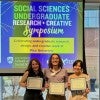
Rice center identifies top 10 hazardous polluters in Hurricane Francine's path
An interactive map developed by the Rice Center for Coastal Futures and Adaptive Resilience identifies the major hazardous polluters in the path of Hurricane Francine.

Rice center identifies top 10 hazardous polluters in Hurricane Francine's path
An interactive map developed by the Rice Center for Coastal Futures and Adaptive Resilience identifies the major hazardous polluters in the path of Hurricane Francine.

Rice experts available to discuss Tropical Storm Francine’s impact on Gulf Coast
Rice University experts Dominic Boyer and James Elliott, co-directors of the recently launched Center for Coastal Futures and Adaptive Resilience, are available to discuss the vulnerabilities of the Gulf Coast to major storms.

Hordge-Freeman honored with prestigious American Sociological Association awards for recent book
Hordge-Freeman received the American Sociological Association 2024 Gordon Hirabayashi Human Rights Book Award by the Section on Sociology of Human Rights and the 2024 Outstanding Recent Contribution Award by the Section on the Sociology of Emotions.

New Rice center to address impact of climate change on coastal economic powerhouses
Globally, 800 million people living in hundreds of urban areas will face grave social and economic risks from sea level rise and routine coastal flooding by 2050.

Locked out of banking: Incarceration is associated with decreased bank account ownership
People who have served time in jail or prison are less likely to have bank accounts after they are released than they were before serving time, which may hinder their long-term financial security, according to new research.

Report: Underfunded Texas school districts much more likely to have low achievement ratings
The research does not suggest that more money alone would make schools perform better but finds that there is a statistical floor where below a certain level, higher ratings are much less attainable.

According to recent research by sociologists at Rice, Black nationalism now finds broader support among different segments of the Black community, though the characteristics of Black nationalists have changed over time.

Following the murder of George Floyd, evangelical Christians were more likely to avoid the issue of racial injustice, while mainline Protestants and Black clergy addressed the topic in their congregations and in some cases took a stand against it.

Rice’s CAAAS welcomes new faculty, postdoctoral associate
Rice’s Center for African and African American Studies is expanding its offerings and expertise with the appointments of Elizabeth Hordge-Freeman, Khadene Harris and Ayodeji Olugbuyiro.

Rice University experts are available to discuss a variety of hurricane-related topics with the media.

Houstonians’ views on social issues, the biggest challenges facing the region and more findings from the 2024 Kinder Houston Area Survey were presented at the Rice University Kinder Institute for Urban Research’s annual luncheon at the Hilton Americas in downtown Houston May 20.

Nearly nine in 10 area residents believe Houston should lead the world in transitioning to alternative energy sources, according to Rice University’s 43rd annual Kinder Houston Area Survey. More than 80% of Houstonians also said the energy transition was necessary to the city’s economic prosperity.

When faced with perceived racial discrimination in the workplace, new Rice University research finds that Christians lean on their faith to get them through these experiences. However, researchers warn this can lead to employee exploitation or, on the flip side, encouraging feelings of victimhood.

Faculty, staff, students honored for excellence in teaching, mentoring, service
Each year, Rice honors members of the university community who have served students through outstanding teaching, dedication and service.

Student research highlighted during Social Sciences Undergraduate Research + Creative Symposium
Research on racial identity and fair pay, mental and physical health, foreign affairs and other topics was on display at the Social Sciences Undergraduate Research + Creative Symposium (SSURS) held April 11 at Rice University’s Kraft Hall.